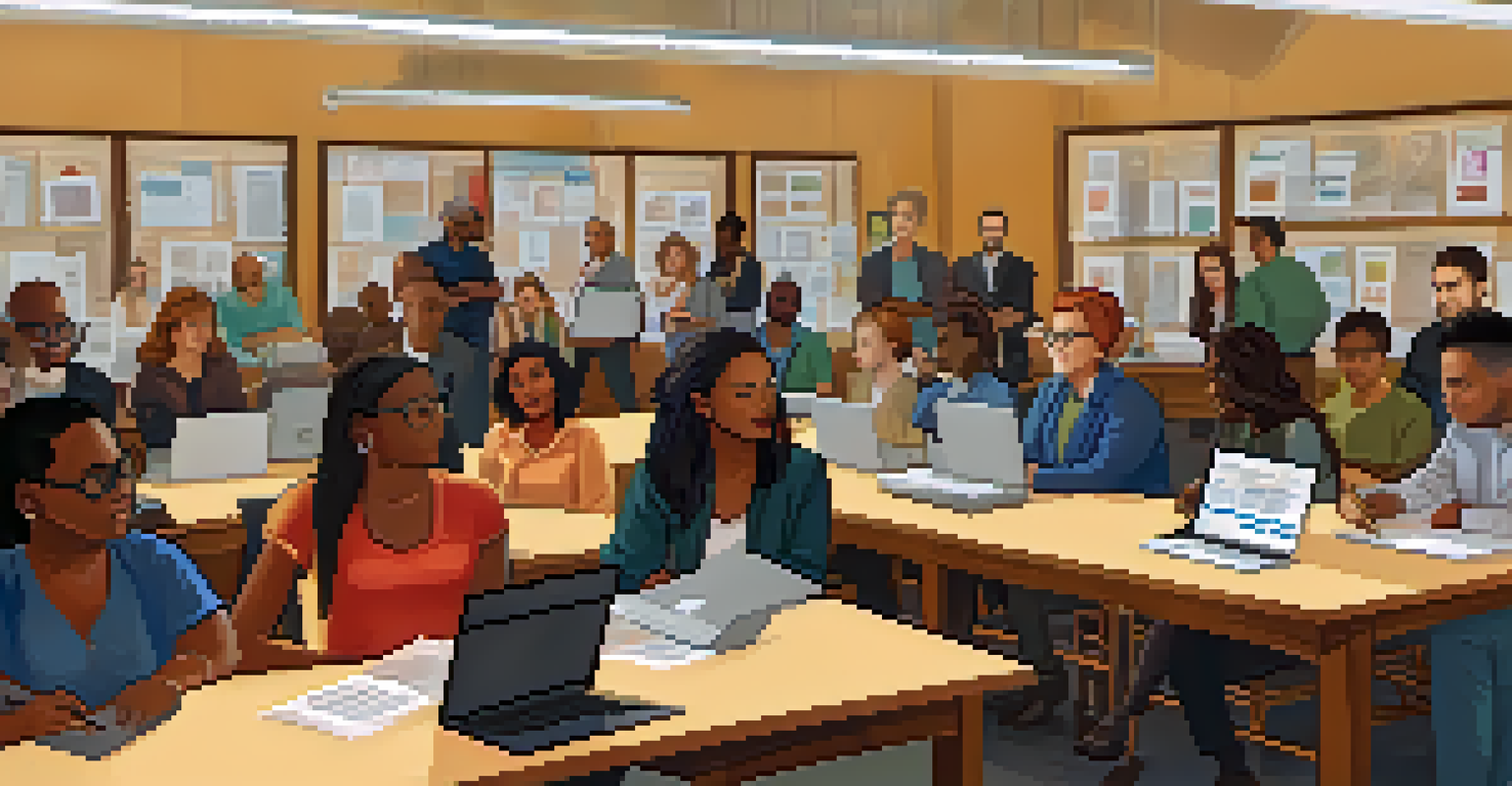The Impact of Public Libraries on NYC's Local Economy

Public Libraries: Vital Community Hubs in NYC
Public libraries in New York City serve as essential community hubs that foster engagement and learning. They offer a plethora of resources, from books to digital media, catering to diverse populations. This accessibility not only promotes literacy but also draws in visitors from various neighborhoods, stimulating local interactions.
Public libraries are the heart of a community, providing access to information and resources that empower individuals to improve their lives.
Moreover, these libraries provide spaces for workshops, events, and gatherings, further enhancing community ties. By offering free programs, they significantly reduce barriers to education and cultural participation. This helps to create a more informed and connected citizenry, which is vital for a thriving local economy.
As more people frequent these libraries, nearby businesses also feel the positive ripple effects. Cafés, shops, and restaurants benefit from the influx of visitors, creating a symbiotic relationship between the library and local commerce.
Job Training and Workforce Development Initiatives
Many public libraries in NYC offer job training and workforce development programs that are crucial for local job seekers. These initiatives often include resume-building workshops, interview preparation, and even tech training, equipping individuals with essential skills for today’s job market. By empowering residents to improve their employability, libraries contribute directly to economic stability in the community.

Furthermore, these services are typically offered at no cost, making them accessible to everyone, regardless of economic background. This inclusivity ensures that all residents have a fair shot at gaining employment, which in turn boosts local economic activity. As people secure jobs, they contribute to the economy by spending their earnings in local businesses.
Libraries Boost Local Economies
Public libraries stimulate local commerce by attracting visitors who support nearby businesses.
The impact of these programs extends beyond individual success stories; they create a more skilled workforce that attracts businesses looking to set up shop in the area. This can lead to job creation and further economic growth, illustrating the library's role as a catalyst for change.
Cultural Enrichment and Economic Development
Public libraries are not just places for books; they also serve as cultural landmarks that enrich local communities. Through art exhibitions, author readings, and cultural festivals, they create vibrant spaces that celebrate diversity and creativity. This cultural enrichment attracts visitors and tourists, which can significantly contribute to the local economy.
A library is not a luxury but one of the necessities of life.
When libraries host events that highlight local artists or cultural activities, they not only promote community pride but also draw in crowds that patronize local businesses. This creates a lively atmosphere where both the library and surrounding enterprises can thrive together. It's a perfect example of how culture and commerce can complement each other.
Additionally, libraries often collaborate with local organizations to promote cultural initiatives, further strengthening their role in community development. These partnerships can lead to increased funding and resources, ensuring that libraries continue to be integral players in NYC's economic landscape.
Access to Technology and Innovation
In an age where technology drives economic growth, public libraries provide crucial access to digital resources and technology training. Many libraries offer free internet access, computer usage, and tech workshops, enabling residents to stay connected and informed. This support is especially vital in underserved areas where access to technology may be limited.
By bridging the digital divide, libraries empower individuals to harness technology for personal and professional growth. For instance, those who learn to navigate online job portals or digital literacy skills can better compete in the job market. This not only enhances their employability but also fosters innovation within the community.
Job Training for Economic Stability
Libraries provide essential job training programs that empower residents and enhance workforce skills.
Moreover, as libraries evolve into tech hubs, they attract partnerships with tech companies and educational institutions. This collaboration can lead to sponsorships, grants, and other funding opportunities that further enhance the library's resources, ultimately benefiting the local economy.
Library Programs Supporting Small Business Growth
Public libraries in NYC play a pivotal role in supporting small businesses through various programs and resources. Many libraries offer workshops on entrepreneurship, marketing strategies, and financial literacy tailored specifically for aspiring business owners. These programs provide invaluable insights that can help small businesses thrive in a competitive market.
Furthermore, libraries often provide access to databases and research tools that entrepreneurs may not afford independently. This access helps small business owners conduct market research, identify trends, and make informed decisions. Libraries thus act as incubators for innovation, helping to nurture local enterprises.
In addition, networking events hosted by libraries create opportunities for small business owners to connect with each other, share insights, and collaborate. This sense of community fosters a supportive environment where local businesses can flourish, ultimately enhancing the local economy.
Encouraging Lifelong Learning and Economic Resilience
Public libraries promote lifelong learning, which plays a crucial role in economic resilience. By offering a diverse range of educational programs, from language classes to financial workshops, libraries empower individuals to continuously develop their skills. This commitment to education bolsters the local workforce and enhances the community's adaptability in an ever-changing economy.
As residents engage in lifelong learning, they become more equipped to navigate economic challenges, making the community more resilient overall. A well-informed population can better respond to economic shifts, whether through career changes or entrepreneurial ventures. Libraries thus serve as a foundation for personal growth that translates into broader economic stability.
Promoting Economic Equality
Through free resources and inclusive programs, libraries address economic inequality and foster community equity.
Moreover, communities that prioritize learning tend to attract investment and business opportunities. As libraries foster a culture of education, they contribute to a vibrant local economy that is poised for growth and innovation.
Public Libraries as Catalysts for Economic Equality
Public libraries are essential in addressing economic inequality by providing free resources to all community members. They serve as equalizers, ensuring that everyone, regardless of socioeconomic status, has access to information, education, and technology. This accessibility promotes equity and enables individuals to improve their circumstances.
By offering services tailored to marginalized communities, libraries help bridge the gap in educational and economic opportunities. Programs aimed at underrepresented groups foster inclusivity, encouraging participation in the local economy. This support ultimately leads to a more diverse and robust economic landscape.

Furthermore, when libraries advocate for social justice and economic equity, they raise awareness about systemic issues affecting their communities. This advocacy role enhances their impact, as they not only serve as resource centers but also as champions for change, driving the local economy toward greater equality.